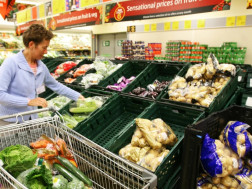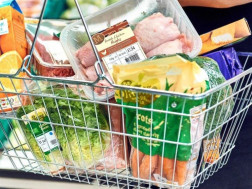Consumer prices in Israel rose an annual 5.3 percent in 2022, up from the 2.8% increase recorded a year earlier, driven by the rising cost of housing, transportation, communication, and food.
The annual inflation rate stood at 5.3% in December, remaining at a 14-year high for a second consecutive month and putting further pressure on the Bank of Israel to hike interest rates again in the following month, in an effort to tame prices.
The consumer price index (CPI), a measure of inflation that tracks the average cost of household goods, rose by 0.3% in December from November, compared with analysts’ expectations of between 0.3% to 0.4%, according to the Central Bureau of Statistics. The annual CPI if 5.3% was the highest since inflation hit 5.5% in October 2008.
In December, dramatic increases were seen in the cost of transportation, which went up by 1.1%; housing and medical services, each rising 0.6%; and apartment maintenance, up 0.2%. These were offset by declines in the prices of fresh fruit and vegetables, down 2.8%; culture and entertainment, down 1.4%; and clothing and footwear, down 1%, according to the statistics bureau.
In 2022, transportation and communication prices increased by 9.2%, housing gained 6.3%, apartment maintenance prices were up by 5.7%, and food prices rose by 4.9%. Since 2017, consumer prices jumped by an aggregate 9%, according to the statistics bureau.
Still, inflation in Israel still remains lower than in most developed countries. In the US, consumer prices from November to December declined 0.1%, the first drop in more than 2.5 years, as gas prices fell. On an annual basis, inflation decelerated to 6.5% in December, compared with a year earlier, down from 7.1% in November, adding to signs that the US Federal Reserve will slow its interest rate hikes in the coming months.
Inflation also has been dropping, though to a lesser degree, in Europe. After months of rising prices, annual inflation in the 19 countries that use the euro currency fell for the second straight month in December, but still stood at 9.2%. That was down from November’s 10.1%, with energy prices having dropped from summertime peaks.
In Israel, the central bank earlier this month hiked interest rates for the seventh straight time, raising its key lending rate by 50 basis points to 3.75%, in another attempt to slow the pace of inflation. The central bank is seeking to bring inflation back into the government’s target range of 1% to 3%.
Bank of Israel governor Amir Yaron remarked that inflation pressure is expected to continue in the coming two months before starting to ease gradually, albeit at a slower pace than previously forecast. Central bank economists now expect the inflation rate to ease to 3% over the coming year, versus 2.5% forecasted in October, and to move to 2% in 2024. The economy is expected to grow at an annual rate of 2.8% in 2023, revised down from 3% forecasted in October, and 3.5% in 2024.
The bank’s research department sees room for further interest rate increases, with the key lending rate forecast to reach 4% in the coming year, up from 3.5% in its prior estimate.
Bank Leumi economists expect the central bank at its next monetary meeting on February 20 to lift borrowing costs by 25 basis points to 4%.
The central bank’s forecasts were published before a new government plan to combat the high cost of living was announced on Wednesday night. As part of the plan presented by Prime Minister Benjamin Netanyahu and Finance Minister Bezalel Smotrich to slow the pace of inflation, recent price hikes affecting core utilities, fuel, and municipal property taxes, will be frozen or reduced.
Among the measures are a one-year freeze in municipal property tax rates; reducing the excise fuel taxes by NIS 0.10 a liter until the end of 2023, effectively rolling back the January NIS 0.09 fuel price hike, as 95-octane gas prices are set monthly by the government; reducing the January-scheduled 8.2% electricity price hike to only 2.5%; and similarly, reducing the planned 3.5% water price increase to only 1%.
Bank Leumi chief economist Gil Bufman estimates that the government measures combined with a strengthening shekel — which gained about 4% during the past week — are expected to moderate the price indices for January and February.
"These are one-time changes in prices and not measures of an ongoing nature,” Bufman wrote in a report on Sunday before the publication of the CPI figures. “We believe that in the coming two months, the actual inflation rate, measured over the past 12 months, is expected to continue to range around the level of 5%, before starting to decline.”
Leumi had forecasted an increase of 0.4% in the December CPI, taking annual inflation to 5.4% during 2022. In 2023, the rate of increase in the CPI is expected to range around 2.50%, according to Leumi, TOI reports.
















